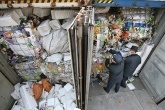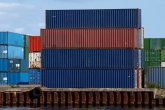Urgent China response must be couched in quality, says Gover
A response to the ‘urgent problem’ of Chinese restrictions on imports of paper and plastic wastes will need to focus on quality and markets, WRAP CEO Marcus Gover has told trade associations and Defra in an open letter.

China notified the World Trade Organisation in July that it would be seeking a ban on unsorted paper and other materials and in August announced that it would set new standards limiting all imported recycled materials to a maximum contamination level of 0.3 per cent.
‘If implemented,’ Gover wrote, ‘these extreme measures would effectively prevent the export of all household plastic packaging for recycling and all mixed paper for recycling from the UK to China. We currently export over one million tonnes of recovered mixed papers and around 180 thousand tonnes of post-consumer recovered plastic packaging to China. These make up around 70 per cent of our mixed paper exports and around 25 per cent of our plastic packaging exports.’
In 2016, 55 per cent of the recovered plastics the UK exported went to China and Hong Kong – more than six times as much as went to the next largest export market (Malaysia).
This action means that addressing quality is paramount, both in terms of supplying China and other nations. Gover wrote: ‘We all need to recognise that improving the quality of recycled materials is critical to the continued growth and success of the whole recycling supply chain. China and other countries importing recovered materials need to feel confident we are not dumping our waste on them.’ Later in the letter, he wrote: ‘Measures such as moving away from simplistic weight-based targets and options for extended producer responsibility could contribute to increasing quality.’
Meeting the 0.3 per cent level of paper contamination will be ‘very challenging’, said Gover, adding that data suggests we are ‘nowhere near’ meeting this standard – suggesting that it may only be possible for paper that is collected separately.
‘With China taking 75 per cent of our total recovered paper exports we have to question whether single stream commingled collections are fit for the future. We do now have advances in bin technology that mean a three-box system can occupy the same space as a single commingled recycling bin. In this way, we can make it easier for citizens to separate materials for recycling.’

However, despite the potential of lost markets in China, Gover is confident that recycled material will continue to find a home: ‘Following the global economic crisis of 2008, quality recovered materials continued to find markets. In this situation too, there will continue to be other potential markets for our materials, if we can raise our game.
‘We already export nearly as much plastic packaging to other European countries as we do to China, for example. However, other countries will compete with the UK to supply quality secondary plastic packaging materials; and data from the MF portal show that we are not currently producing sufficiently high quality products to compete effectively in the future. If MRF operators can improve their own infrastructure and processes to produce high quality plastics streams, they will be sought after by importers.’
Regarding plastics, Gover said that ‘very strong markets’ exist for products like PET and HDPE plastic bottles, meaning they will be easy to sell if quality is good and contamination low, with the same being the case of PP pots, tubs and trays.
However, PET trays, PS and PVC have ‘very limited’ markets, and so if they are to be treated domestically, Gover suggested that ‘we really need to rationalise the polymers we use in packaging’.
This is one of the focuses of the Rationalisation of Packaging Working Group being led by the Co-op’s Iain Ferguson as part of WRAP’s consistency framework, published last September. ‘The China situation makes this work more urgent,’ said Gover.
‘The other opportunity, also being promoted in the framework is to use more recycled material directly in the manufacture of plastic packaging. The recent commitment to use 50 per cent recycled content (even if it costs more) by Coca-Cola is very welcome and a great example of the leadership we need to see from others.’
Speaking at the CIWM’s Presidential Dinner this week, Resources Minister Therese Coffey also addressed the China issue, calling it a “headache”, but also an opportunity to improve domestic performance. “The ban prompts the need for us to improve the quality of recycling here and to have greater capacity to recover and reuse those materials here in the UK,” she said.
![]()
![]()









